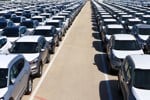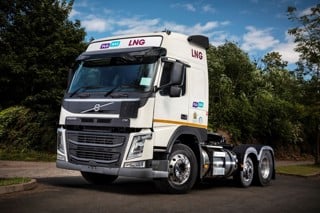Truck fleets look set to be hit by a variety of challenges in the aftermath of the coronavirus pandemic, and financial constraints are likely to affect their ability to cope.
These are things that governments must bear in mind as they roll out new legislation, says Gilles Mabire, head of the commercial vehicles and aftermarket business unit at Continental.
New European Union (EU) regulations designed to cut CO2 emissions from trucks may be laudable, but are likely to land operators with additional costs at a time when profits are wafer-thin.
“The pressure to make transport more environmentally-sustainable will not go away,” Mabire said. “However there needs to be a trade-off between the legitimate intention to protect the environment and the transport industry’s low margins.”
Margins are likely to be especially pinched as economies cope with the ongoing impact of Covid-19 and the downturn it is likely to trigger.
“Cash is king, and everybody is looking to hang on to enough funds to allow them to keep operating,” Mabire said.
The need to reduce emissions is not the only source of regulatory and financial pressure on truck manufacturers and their customers, he added. Legislation designed to prevent accidents and injuries is set to get tougher with the roll-out of the EU’s latest General Safety Regulation (GSR).
Among other changes, it makes blind spot assistance systems obligatory on all newly Type Approved trucks from July 2022 and on all newly registered trucks from July 2024.
It is a trend Continental has long anticipated with, for example, the development of its turn-assist system. Capable of being retrofitted, it uses radar to detect the presence of a pedestrian, a cyclist or a scooter rider in a truck’s blind spot at junctions and alerts the driver accordingly.
“Traffic is increasing globally and vulnerable road users have to be protected,” said Mabire. “Drivers have to be helped to make the right decisions.”
Changes such as those mandated by GSR could lead to truck driving becoming increasingly automated as more intelligent functions are added.
“More safety will help to change the image of trucks,” Mabire added; an image that is not always a positive one so far as the general public is concerned.
At the same time, connectivity is becoming increasingly important, allowing trucks to communicate with fleets, fleet customers, manufacturers, service workshops and other vehicles.
It can drive down total cost of ownership (TCO), but Mabire is concerned that only the biggest operators will be able to take advantage of what it has to offer; and at the expense of their smaller rivals.
“We need to democratise connectivity,” he said. “We’ve got to close the digital gap.”
Greater reliance on connectivity can make fleets vulnerable to cyber security breaches. “Security is something we cannot compromise on,” said Mabire.
However, a recent survey of German transport companies carried out for Continental by the Institute for Applied Social Science has revealed that only half of them have security measures in place to protect against cyber attack.
There is no evidence to suggest that UK fleets are any more cyber security-aware than their German counterparts.
Continental’s head of research and processes for product security Mathias Dehm said: “Although fleets have not, as yet, been in the limelight so far as cyber crime discussions are concerned, they can be attractive targets if, for example, they are carrying dangerous goods.”
Such goods could be stolen because they are valuable; or for use in a terrorist attack.
“Furthermore, logistics companies face potential danger if criminal hackers decide to shut them down in order to extort ransom money, and there is a cybersecurity gap between the few big players and a multitude of smaller firms,” he said.
“Big corporations can develop strategies, hire IT and automotive cyber security specialists, and set up their own cyber units,” Dehm added. “But smaller businesses often lack the awareness and the financial means to do so.”



















Login to comment
Comments
No comments have been made yet.